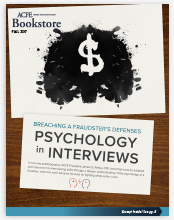Hooked on Fraud Fighting: How I Found My Passion and How I Give Back Now
/GUEST BLOGGER
Alexis C. Bell, MS, CFE, PI, ACFE Regent
International Antifraud Consultant
CEO, Fraud Doctor LLC
I am often asked, “How did you get into fraud?” Though it’s more accurate to say I’m in “anti-fraud” rather than fraud, I understand the question. What made me decide to go down this path?
I am reminded of the time in my life when I was the controller for an international textile firm. By then, I had 13 years of experience in management and nowhere to advance. This was a new company for me. As I settled in, I heard staff complain that what was in the “system” never matched what was out in the warehouse. Being a bean counter where accuracy was paramount, I asked when they last performed a physical inventory. After being met with the deer-in-the-headlights look and realizing they had never done a physical inventory, I announced everyone was coming in that weekend and we were going to straighten out the inventory situation.
Now that I have the privilege of serving on the Board of Regents for the ACFE, I have the honor of making a difference at the international level.
Alexis Bell, MS, CFE, PI, ACFE Regent
As the least popular person in the building that Saturday morning, it was only a matter of hours before I grasped the full situation. There was a reason things were not lining up. We launched an internal investigation and identified a fraud scheme where the warehouse manager was selling directly to clients and pocketing the cash. We even found completely full hotel rooms floor-to-ceiling with products stolen from our warehouse. In that moment, I realized two things. One, how colossally bored I had been doing “regular” accounting where nothing ever changed but the volume of paperwork. And two, how much fun I had using my accounting skills to help with the investigation. That was it. I was hooked. I made the decision to transition to forensic accounting and never looked back.
After making the jump, I found my new home at the ACFE. It was here that I learned what I needed to about how to investigate fraud. Back then, there were no degree programs. You had to learn on the job. It was my self-study with ACFE training, books and materials that gave me the foundation to quickly understand what I was seeing in the field. I created structure for an environment that at that time had none. I was a sponge for knowledge, learning everything I could get my hands on. What I learned from those materials and mentors often made the difference between being successful during the investigation and not.
Fast forward many years, and I had the honor to give back to the beloved organization that helped me so much in the early years. I served on the local chapter board as the board secretary and then later as the board president. Together, we created outreach programs for our community and shaped the courses that were beginning to arrive in academia. We helped members locate related job openings and brought in truly outstanding speakers for thought leadership in training efforts.
After the ACFE Board of Regents election last year, I attended my first board meeting at the international headquarters in Austin, Texas. I had the opportunity to finally meet the ACFE staff who I had only spoken to on the phone or emailed in the past. I am grateful for the chance to individually meet and speak with every single employee. What struck me was how happy everyone was and how much they loved their job. It was a remarkable experience to meet the people who developed, published, disseminated and advocated the very same material that helped make me successful as an investigator over the course of my career. I was amazed at how much each person understood and appreciated their contribution to making the world a safer place from fraud. It endeared me to the ACFE all the more.
Now that I have the privilege of serving on the Board of Regents for the ACFE, I have the honor of making a difference at the international level. I find that having experience in different regions in the world means I bring a unique perspective to the role of the Regent. Other members bring perspectives from industries, government, academia and insight into what the future landscape holds. The two-year term is short in consideration for all of the ideas the board has for working with the staff and moving the ACFE into the next era. We can’t possibly get it all done within that timeframe. Some of it will have to be completed by the new Board of Regents members. They will bring a fresh perspective and even more possibilities with them. Time is running out to make your selection for the incoming board members. Cash in on your right to vote and make your voice heard.







